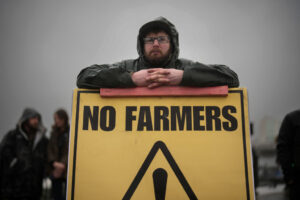When you think of the politics of farmers, what comes to mind? Perhaps the Countryside Alliance, and the people of Deep England, dressed in Tory tweed and protesting the fox hunting ban. Or maybe the agrarian populism of the Dutch BBB and their conflict over nitrogen fertilisers. You’d equally be forgiven for thinking that the character of the current wave of European farmers protests were entirely Right-wing. In Britain, the Left has largely been silent as Welsh farmers in Carmarthen, and then across the country, revolted against the devolved Labour government. Meanwhile, it has fallen to commentators on the Right to make the observation that without farmers there would be no food.
Across the Channel, a similar narrative has played out. As ever, the French farmers played at a higher tempo than the British, with cities placed “under siege” by the farmers’ tractor convoys. In scenes reminiscent of Houellebecq’s Serotonin, things turned violent, with one death and two severe injuries on one blockade in Ariege. The media in France has also emphasised the conservative character of the protests, which Rassemblement National’s Jordan Bardella has exploited in a charm offensive the Liberation newspaper dubbed “the politics of the selfie”. The Macron government was equally selective in its response, reacting to the perceived anti-ecologism of the protesters by suspending the Ecophyto Plan which aimed to halve pesticide use by 2030 (no move was made on the question of fair remuneration). But the general portrait painted was that the farmers were homogenous, all angry about the same things in the same way, with perfectly aligned interests.
The reality is far more complicated and politically obscure. Rather than part of a specific political movement, the protests are evidence of the fragmentation of French politics and the democratic crisis of a country where vast swathes of the population feel unrepresented, and yet no stable and unified alternative can emerge. And this situation captures something broader about the confused nature of French and European populism in this present moment, in which all factions and fringes on Left and Right have something to play for.
In France, the initial explosion was spontaneous and not coordinated by the major farmers unions, erupting out of the south-west. And given the stark divergences in their demands, it would be much more accurate to speak of “des agriculteurs” as opposed to “les agriculteurs”. It’s true that there is an organised Right-wing faction: the people beaming in Bardella’s selfies, often organised through the Coordination Rurale union. In the centre there are those represented by the FNSEA, the main agricultural union whose interests are quite close to the state and whose members aren’t always ideological, articulating a mixed-bag of interests-based demands. But on the Left, largely overlooked in the coverage, is the Confederation Paysanne: the union of smallholding peasant farmers which represents about 20% of the total.
Laurence Marandola is spokesman for the group, a small farmer who grows apples and herbs, and raises llamas for wool. She tells me that “there are plenty of farmers who have been completely forgotten by the political class. This has never been taken seriously because in France there is a massive diversity and inequality between farms as in the rest of society… There are 18-20% of French farmers who live below the poverty line and half of farmers are on below the minimum wage.” The Confederation Paysanne doesn’t have a monopoly on these small farmers, the ones most at risk from the suicide epidemic plaguing French agriculture, but they make up the bulk of its membership.
While still part of the same farmers’ movement, the Confederation Paysanne has political disagreements with the other unions. As far as Marandola is concerned, the bigger unions have engaged in a form of “recuperation” of the campaign, resulting in a focus on the usual suspects of Europe and environmentalism. Confederation Paysanne instead find French farming’s “deep malaise” in the numbers of farmers going bankrupt and struggling beneath a brutal workload. The blanket opposition to ecological policies is also something of a caricature. A study by Collectif Nourrir found that only 15% of French farmers rejected the idea of ecological transition, while 62% deemed it necessary and a further 23% said it could even be an opportunity. As with policies like Ulez, there is frequent dissonance between supporting the need for ecological transition and then becoming the financial victim of the measures aimed at achieving it. But according to the Confederation Paysanne, many more farmers would be open to the measures if they were given sufficient support.
What unites the farmers behind the Confederation Paysanne is instead their anti-corporatist tendencies. Beyond their environmental concerns, they support the Ecophyto Plan because the chemical fertilisers it aims to phase out enable the expansion of the major agribusinesses, “which are predators for the other types of agriculture”, as Marandola puts it. For the small farmers who make up the Confederation, ecology isn’t just a virtuous idea or a moral concern. It is the site of the conflicting interests between peasant farmers and these massive companies. And nowhere is this more evident than in the battle over megabasins. These are large man-made reservoirs which provide water for big agribusiness so they can maintain crop yields through drought, which is a growing problem in parts of France. For the farms served by the megabasins, they are a necessary adaptation to climate change that allow them to maintain the national food supply.
The argument against them, made by the coalition of environmental radicals which includes the Confederation, is that they are highly inefficient (since water evaporates off the surface) and that they drain the water table, making them unsustainable in the long run, all while hoarding water from ordinary people and small farmers. And this clash represents one of the most violent divisions within the farmer’s movement. At what has become known as the “Battle of Sainte-Soline”, last year the Confederation Paysanne were directly involved in the sabotage of a megabasin pump which saw several protesters hospitalised in comas and hundreds more injured, along with dozens of police. In a similar case a few months earlier at the Cram-Chabin megabasin, Confederation Paysanne members were also arrested for sabotage. The united front between all farmers big and small, does not survive the zero-sum conflict over water.
Beyond Bardella’s show of support, the populist Left has made some attempt to become the face of this side of the farmers’ movement. Jean Luc Mélenchon has not made an appearance at the Salon Agriculture, an annual meeting at which politicians are usually desperate to be seen supporting farmers, for 10 years. Instead, he has hosted a counter-salon, laying out an alternative vision of agriculture rooted in the principles of anti-globalisation. This vision has seen La France Insoumise, Mélenchon’s party, act as the most consistent opposition to free trade agreements at the European level. And in this regard, they speak directly to many farmers’ concerns: a new free trade agreement with New Zealand which may lead to the EU being flooded with cheap beef has rattled agricultural unions across the spectrum.
This represents a new direction for the French Left, which tacitly accepted economic globalisation in the Eighties under the leadership of the Parti Socialiste (at the expense of its traditional social base). And even after 2008, the Left remained largely urban, educated and dominated by downwardly mobile graduates. Their resulting programme was therefore generally supportive of European integration, and free-flowing goods and capital, cutting it off from other potential coalition partners, such as farmers. The populist Left was more Eurosceptic, but still struggled to win over peripheral France.
But if La France Insoumise leans further into this politics, they may be able to build a new coalition of voters to challenge the electoral success of the populist Right over the past decade. Farmers in advanced capitalist nations have traditionally voted for the Right, with analyses conducted in the Seventies attributing this “peasant conservatism” to an affinity with other land-owning classes, and a rural lifestyle left relatively unchanged even as the cities were experiencing radical upheavals. However, as the onward march of neoliberalism slowly liquidates the livelihoods of small-hold farmers, one can imagine a Left that stands up for their economic interest being able to make gains.
This leaves a space open which La France Insoumise is taking tentative steps towards capturing. In 2022, Mathilde Hignet, the Insoumise candidate in Ille et Villaine, became the only MP whose pre-election job was agricultural labouring. And one of the most prominent members of La France Insoumise, and 2027 presidential hopeful, Francois Ruffin, has been a tribune of French peasant agriculture for many years now. In recent weeks, he’s been touring the countryside and meeting farmers, just as he did during the Gilets Jaunes protests several years ago.
And, for now, it is the Gilets Jaunes who the French farmers most resemble. Like that earlier movement, the farmers are not an easily identifiable political force, but an ideological melting pot, the product of creative destruction at both ends of the political spectrum. Both uprisings have similarly caught the institutions that usually represent these sections of society off-guard: the trade unions were stunned by the aggression and quick success of the Gilets Jaunes; and the farmers’ movement began without the input of the agricultural unions, which then scrambled to keep up. Both movements even have a similar tactical repertoire, with their weaponisation of traffic and use of road blockades.
The alignment is unsurprising — there was always a significant farming presence among the Gilets Jaunes, and parts of the movement who remain active have joined the farmers in their protests. And the continuities mean the same political opportunity is here, waiting to be exploited. If politicians on Left or Right can become the voice of this messy synthesis of economic rage and communitarianism, an army of radical and angry farmers could be theirs for the taking.
Disclaimer
Some of the posts we share are controversial and we do not necessarily agree with them in the whole extend. Sometimes we agree with the content or part of it but we do not agree with the narration or language. Nevertheless we find them somehow interesting, valuable and/or informative or we share them, because we strongly believe in freedom of speech, free press and journalism. We strongly encourage you to have a critical approach to all the content, do your own research and analysis to build your own opinion.
We would be glad to have your feedback.
Source: UnHerd Read the original article here: https://unherd.com/



